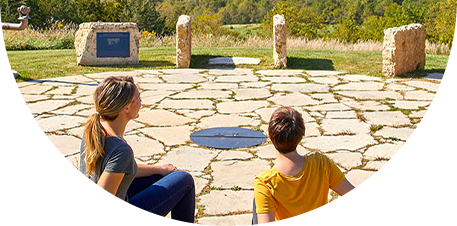Potable Water Supply
The department staff reviews plans, issues permits, inspects the construction of new private water wells, and performs well evaluations for real estate transactions. Staff also collects water samples from your home for new wells, real estate transactions, and newborn & suspect waterborne illness and provides consultation associated with the laboratory analysis; assists in sealing abandoned wells; performs comprehensive well inspections annually for every licensed well driller that drills in the county; investigates complaints of potential water pollution; performs sanitary surveys for non-community water supplies; permits and inspects geothermal closed loop systems.
Step by Step Process
All private water wells are to be permitted, installed by a licensed well driller and inspected to determine if the installation meets applicable state code and local ordinance.
- Water Well Construction Code
- Water Well Pump Installation Code
- Jo Daviess County Protection of Water Supply Ordinance Title 5 Chapter 7
- Variance – on the rare occasion where conditions exist at a proposed site that make compliance with the requirements of state code and local ordinance impractical or impossible, a variance may be requested by submitting a written proposal.
- Select a Contractor – choose a licensed well driller who will apply for a well permit. Once the staff reviews the application a permit will be issued. A copy of the permit will be sent to the contractor.
- Inspection – once the well driller has completed the well, an inspection takes place to check if the system was installed in the correct location and meets applicable state code and county ordinance.
- Sample – a water sample will be collected and analyzed, free of charge, for coliform bacteria, E. coli, nitrates & nitrites at the Illinois Department of Public Health Laboratory in Springfield. Lab results take approximately one week from the time of the initial sample.
- Resample –if bacteria is found in a water sample, disinfection, or “shocking”, of the well is recommended. Chlorine, in sufficient amounts and applied properly, is an effective way of eliminating bacteria from a water supply.
- Record – a Water Well Construction & Pump Installation Report is completed and kept on file in the environmental health office. This report has distances to the septic tank and drainfield, depth of well, depth of casing, depth of pump etc. It is a good idea to have a record of your well report in case repairs are needed.
- Evaluations – well evaluations for the purpose of a real-estate transaction are not required by the Jo Daviess County Health Department but may be required by lending agencies or in real-estate contracts. It is a good idea to have one done for liability purposes and to prevent unexpected expenses related to well repairs or replacement. To apply for an inspection, you may complete the downloadable form and either fax, mail, or bring the form to the office along with payment.
- Sealing – when a well is not used for 30 or more days, it is considered abandoned. Abandoned wells are a risk to groundwater quality because they are a direct conduit to aquifers that wells pull their water from. It is important to seal abandoned wells not only to protect the groundwater, but to protect your existing well from possible contamination. Currently, the Jo Daviess County League of Women Voters is sponsoring a cost share program that will pay for 80% of the costs of sealing an abandoned well. Call the office at 815-777-0283 for more details.
Well Sampling Information
- Sampling –it is recommended that homeowners sample their wells for coliform bacteria, E. coli, nitrates & nitrites annually or anytime work is done to the well to determine if the well is free from contaminants. This office will sample your well, free of charge, if you are pregnant or have a child up to three years old in your home or have a doctor’s notice to have your water sampled because of gastrointestinal illness.
Geothermal Closed Loop System
Beginning January 1, 2015, a permit and inspection is required for the construction, modification, or sealing of a closed loop well system. Registration of closed loop well construction contractors is also required.
Education for Homeowners
The Private Well Class is designed to help a homeowner better understand how to properly care for their water well, to ensure their water remains safe to drink. By understanding the basic science of water wells and following best practices to maintain and protect your water supply, this class will provide the tools you need to ensure a safe water supply and help extend the life of your well. The following topics will be covered in the ten part email course:
- understanding how groundwater moves and gets into your well
- how water gets from your well to your faucet
- basics of well construction and the type of well you have
- how groundwater and wells get contaminated
- common operations issues for well owners
- how to care for and maintain your well, pump, and infrastructure
- testing your well water and ensuring water is safe to drink
- understanding test results and fixing water quality problems
- understanding regulations that affect you
- what to do in an emergency or equipment failure
- where to find help and get questions answered locally

Document Center
The Document Center provides easy access to public documents. Click on one of the categories below to see related documents or use the search function.
 (815) 776-0335
(815) 776-0335 330 North Bench Street , Galena, IL 61036
330 North Bench Street , Galena, IL 61036






